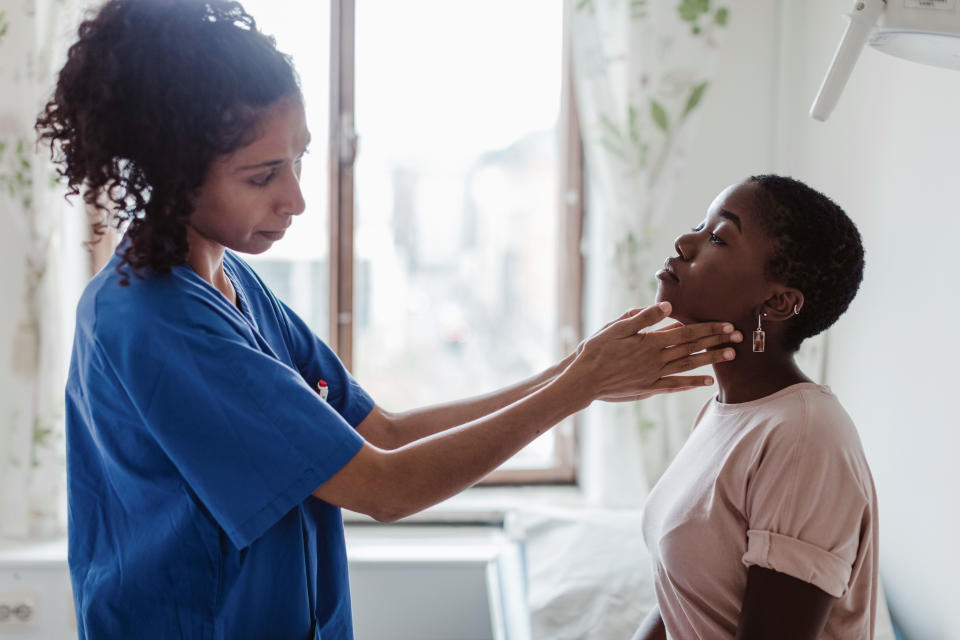Is this the end of the sick note?

The days of soldiering on and showing up to work with the sniffles and a cough are over as the age of pandemic vigilance kicks off.
But what does that mean for the sick note?
Companies’ requirements for staff to get a doctor’s certificate for one or two days’ absence will likely change, author and founder of human performance consultancy at Corporate Dojo Karen Gately told Yahoo Finance.
But it’s something that will need to be carefully managed to avoid disastrous side effects.
Gately said the requirement for sick notes largely comes from two objectives: among good managers and leaders, it’s a desire for staff who are ill to receive care and treatment. At Gately’s firm, sick notes are a requirement after two days for this reason.
But at other companies, the sick note requirement is a symptom of a culture of distrust and micromanagement.
And as coronavirus continues to pose a threat, it’s changing the way businesses think.
“Now, we’re sitting in those seats going, ‘Well, what do we want from people? If they’re sick, we don’t want them to come in, but we don’t want to make it hard for them if we don’t want them to come in’,” she said.
“We’ve got heightened insecurity about what they could be sick with and therefore for them to come back into the office, we might argue that they need to have gone to a doctor.”
It’s hard to know which way it will go in the future: will businesses demand more sick notes or will they demand less to encourage people to just stay home?
“I think we’re going to see a blend of it,” Gately said. “Employers are going to say, ‘Any sign of feeling unwell, do not come in. In this day and age, we can work from home. If you do feel up to contributing on some level, if that’s in your best interests from a health perspective, just don’t come in.’”
Those employers won’t ask for sick note in those circumstances. But employers who aren’t trusting will likely find it a way to exert further control.
“That’s when you get an absolute policing approach to setting policy, as opposed to that approach of being sensible and fair and making everyone feel comfortable.”
GPs weary of coronavirus clearance certificates
And the extreme policing is happening already.
The Royal Australian College of General Practitioners (RACGP) on Monday warned against businesses, schools and daycares requiring ‘medical clearance’ or certificates stating that people do not have coronavirus.
“Requiring employees, students or parents of children in day care to have some sort of ‘medical clearance’ or certificate stating that they don't have Covid-19 is a waste of a patient's time and a GP's time. This has been going on for months, it is unnecessary and it needs to stop right away,” RACGP President Dr Harry Nespolon said.
“This is another Covid-19 myth that must be busted. An employer, principal or day care manager is not allowed to dictate that an employee, child or student must have a certificate to return safely to a workplace, primary school, secondary school or day care facility.”
Dr Nespolon said such demands chew up time for doctors to attend to patients who are actually unwell.
“Please think about others and the pressures already placed on GP clinics and don’t ask anyone to provide a medical ‘clearance’ or certificate. We need to focus on those who are actually unwell,” he said.
“We don’t have a limitless supply of testing kits and it’s important to apply a common sense application of how they are used during this pandemic.”
A new approach to the sick note
Policy settings should be about influencing the behaviours that are wanted and reflecting the company’s values, Gately added.
It comes down to culture and attitude: businesses that genuinely care about their workers’ and customers’ health and well-being will be better placed to adapt to new sick leave policies.
“A lot of leaders will hear that and say, ‘Well what if it’s coronavirus and they come in?’” Gately acknowledged.
“The reality is we cannot eliminate all risk; we can only mitigate as much risk as we possibly can, and people who are not feeling unwell could have gotten on the train that morning and sat next to somebody who is unwell, who is going into a different cultural environment, and bring that sickness to the workplace anyway.”
One side-effect of the new approach to sick leave will be reduced absenteeism or ‘sickies’, Gately added.
That hurdle to get out of bed, get dressed, walk to the station and get into the office will disappear; workers feeling a bit tired can just work from home.
“It’s a lot easier when you can just roll out of bed and get onto the couch and grab your laptop,” she said.
“You can still get things done, you can still be productive. It’s just taking out the commute and means workers can still work if they feel it’s doable.”
Join the Women’s Money Movement on LinkedIn and follow Yahoo Finance Australia on Facebook, Twitter and Instagram.

 Yahoo Finance
Yahoo Finance 

